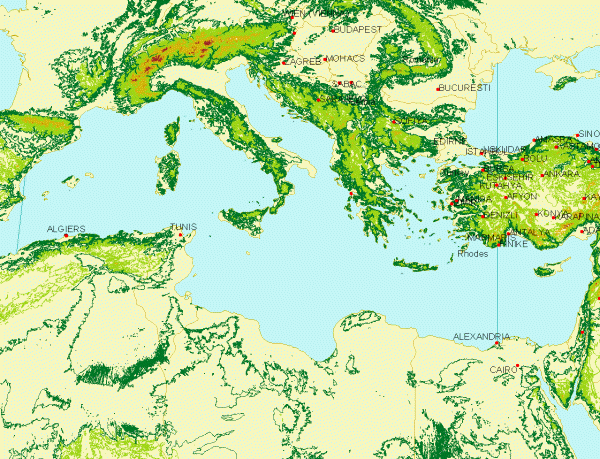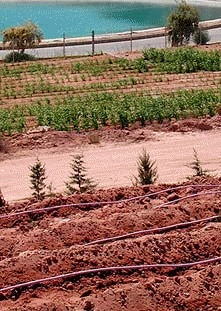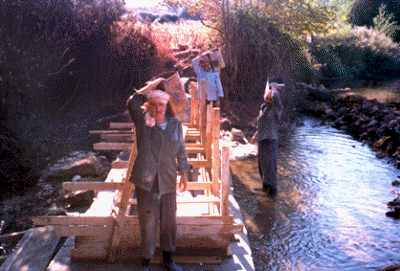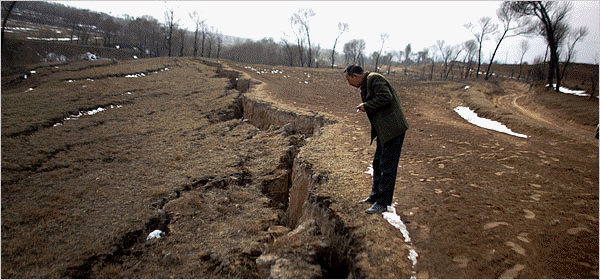
JULY 2006
Environment. The Seas, and Water
Environments in the Mediterranean Basin
UN conference shies from rewriting UN
fishing pact
23 May 2006 23:41:43 GMT Source: Reuters|
By Irwin Arieff
UNITED NATIONS, May 23
(Reuters) - A U.N. conference reviewing a 1995 treaty
aimed at  protecting dwindling fish stocks on the
high seas is unlikely to try to toughen the pact this
year because it is still too new(!?JB),
the meeting chairman said on Tuesday.
protecting dwindling fish stocks on the
high seas is unlikely to try to toughen the pact this
year because it is still too new(!?JB),
the meeting chairman said on Tuesday.
Instead, the week-long conference is expected to urge governments and regional fisheries managers to act on their own to better address overfishing and illegal fishing, said U.S. Ambassador for Oceans and Fisheries David Balton, who is leading the meeting.
| Regional Fisheries
Managers:A Greenpeace
International study circulated at the meeting
reported lax enforcement of existing laws by the regional
organizations that manage
fishing in most of the world's seas. Among the top threats to stocks are illegal and unregulated fishing, an oversupply of commercial fishing vessels and potentially damaging techniques such as bottom trawling, in which nets are dragged along the ocean floor. Some governments and environmental groups have called for a moratorium on bottom trawling until scientists can better assess the extent of the damage it does. But the industry wants a decision on this matter delayed at least until a U.N. General Assembly meeting later this year, said Javier Garat Perez of the International Coalition of Fisheries Association, an industry trade group. |
The treaty was approved by the U.N. General Assembly in 1995 but entered into force just five years ago. It aims to conserve and manage stocks of fish that migrate through the high seas and areas under national jurisdiction.
"The goal is equitable and sustainable use," said Harlan Cohen of the World Conservation Union.
To date just 57 countries have ratified the pact, including the United States. But some major fishing nations, including China and Mexico, have vowed to steer clear of the pact until it can be revised to address their concerns.
Delegates plan to adopt a declaration recommending future actions before adjourning on Friday.
But rather than try to rewrite the pact, "at this point, the general will of the group is to focus on practical means of implementation and application," Balton told reporters
THREATENED WATERS
Illegal long-line fishing kills more than 300,000
seabirds each year Large fish like tuna, cod and
swordfish have declined by as much as 90% in the past
century Over 46,000 pieces of plastic litter are floating
on every square mile of the ocean
World's oceans
reaching point of no return, says UN
By Sam Knight,
Timesonline.
The UN has warned the world's governments that
humankind's exploitation of the sea could be passing the
point of no return.
A report by the United Nations Environment Programme (UNEP) found that more than half of the world's fish stocks are being exploited to their full extent, with nearly a quarter suffering from over-fishing.
Meanwhile, pollution, litter and deep sea drilling are all reaching into the depths of a marine environment hitherto preserved from the hand of man.
In the Central Pacific, the study found, there is now up to 6lb of marine litter to every 1lb of plankton. Elsewhere, there are around 46,000 pieces of plastic litter for every square mile of the world's oceans. Achim Steiner, UNEP’s new executive director, said that particular attention must be paid to the 60 per cent of the world's oceans that are beyond the reach of national jurisdictions and conservation efforts, where modern technology and a lack of regulation is combining to harm the environment. "Humankind's ability to exploit the deep oceans and high seas has accelerated rapidly over recent years," he said. "It is a pace of change that has outstripped our institutions and conservation efforts whose primary focus have been coastal waters where, until recently, most human activity like fishing and industrial exploration took place. We now most urgently need to look beyond the horizon and bring the lessons learnt in coastal water to the wider marine world."
According to the report, just 1 per cent of the world's 3.5 million fishing boats are thought to be large, industrial vessels, but the giant loads they trawl from the deep sea account for around 60 per cent of all the fish caught on the planet. Industrial fishing has helped to drive down the world's stocks of tuna, cod, swordfish and marlin by as much as 90 per cent in the last century.Adding to the strain on the oceans, the UN estimated that nearly $10 billion of fish are caught illegally each year, up to 30 per cent of which is taken from unregulated waters.
Illegal longline fishing also kills more than 300,000 seabirds every year, including 100,000 albatrosses. Nineteen out 21 albatross species are now threatened with extinction.
The report also described a range of activities, including energy development and scientific research such as "bioprospecting" - the collection of biological artefacts for new products - that encroach on waters up to 2,000m below the ocean surface. "Throughout the oceans, shipping, military operations and seismic exploration have intensified with growing impacts on deep water and high sea ecosystems and biodiversity," said Kristina Gjerde, a UN High Seas Policy Advisor who wrote the report. "The spectre of climate change and its impacts such as ocean warming and acidification underscore the need to reduce direct human impacts, because healthy ecosystems are better able to respond to changing oceanic conditions."
Action urged to protect deep seas BBCWorldNews
Urgent action is needed to protect the world's oceans from human exploitation, according to conservationists. They say over-fishing, pollution and climate change are pushing marine areas to the point of no return. The warning comes from the United Nations Environment Programme (Unep) and World Conservation Union (IUCN).
In a report launched on Friday in New York, they are calling for new marine protected areas to be set up in deep seas and open oceans. Dr Stefan Hain from Unep said it was a crucial moment for the marine environment. "Very often, it's the case that people go out there and fish without considering what effect this has on the fish stocks," he told BBC News. "We know now that the environments and the eco-systems in the deep water are very fragile. "The impact is that these stocks are being reduced at an alarming rate, and, simply, these ecosystems are not designed to cope with drastic impact by human activity."

ADAPTATION TO CLIMATE CHANGE
THE MEDITERRANEAN
To date much of the international and national work on climate change has focused on reduction of GHG emissions, rather than adaptation to climate change per se. Attention is now shifting to adaptation planning, as called for under the UNFCC. IUCN developed a collaborative programme to assist eight Mediterranean countries in their efforts to better integrate climate change considerations in their water and wetland resource management policy and practices; and, to advance climate change adaptation planning in a manner consistent with the United Nations Framework Convention on Climate Change (UNFCCC) and compatible with the Ramsar Convention. Under the Mediterranean component of the programme, country baseline studies were prepared for Cyprus, France, Greece, Italy, Morocco, Spain, Tunisia and Turkey. These studies, together with 4 papers on crosscutting themes (floods, droughts, water resources planning, and wetlands), informed a regional roundtable discussion with 85 participants held in collaboration with the Global Water Partnership in Athens in December 2002. The "Dialogue on water and climate" provided financial support for the initiative through WANI.
In 2003, these reports have now been translated in to English, French and Spanish and published as a full resource package on this issue, and follow-up activities with different partners are being discussed.
| an
"environmental flow" is the water
regime provided within a river, wetland or
coastal zone to maintain ecosystems and their
benefits where there are competing water uses and
where flows are regulated. INTERNATIONAL
ORGANIZATIONS ACCEPT ‘ENVIRONMENTAL\
FLOWS’ AS SOLUTION TO SOCIAL CONFLICT OVER
WATER |
IUCN to support the Government
of  Jordan
in the restoration of the Zarqa River Basin
Jordan
in the restoration of the Zarqa River Basin
13 June 2006
In collaboration with the Jordanian Ministry of Environment, IUCN West, Central Asia & North Africa (WESCANA) Regional Office is developing an integrated approach to restore the Zarqa River Basin in Jordan. During his recent visit to the Ministry of Environment, IUCN Head of Global Water Programme, Dr. Ger Bergkamp highlighted the importance of this partnership which aims at applying IUCN global knowledge, approaches and tools developed by the Water and Nature Initiative.
Working with the Ministry of Environment, IUCN has organized two national multi-stakeholders workshops on Zarqa Basin to devise a strategy for river restoration, and has planned further consultation to define common approaches and practical steps forward in building on an integrated water management strategy. All stakeholders will be involved in building trust and commitment to move forward with actions and investments to balance needs, reduce pollution and bring Zarqa back to life.
The WESCANA Region is characterized as one of the driest in the world and water scarcity is a constraint for socio-economic development. The major factor that urged IUCN to take this step in partnership with Ministry of Environment is the rapidly growing population and demand for natural resources in the Amman-Zarqa area. The region faces the world’s biggest water management challenges, with increasing water consumption and pollution from industries and citizens putting major pressures on the water resources. For instance, polluted water is very often used to irrigate the 8,400 hectares of crops in Jordan, which poses significant health risks for consumers.
IUCN is in
the process of developing a number of demonstration sites
in the Zarqa River basin that will facilitate closer
collaboration between water practitioners, water users,
policy makers, and promote innovative water management.
For more information :
On the Zarqa River Basin :
Ms. Nadia Juhari IUCN WESCANA Water Project Manager, nadia.juhari@iucn.org
On the IUCN Water and Nature Initiative :
David Alix,
Communication Officer, Water Programme, IUCN
headquarters, david.alix@iucn.org
 IUCN WESCANA expands collaboration with
Lebanon in the water sector
IUCN WESCANA expands collaboration with
Lebanon in the water sector
IUCN West Central Asia and North Africa (WESCANA) Regional Office has strengthened its cooperation with its non-governmental members, state members, and partners during a mission to Lebanon paid by Dr. Odeh Al-Jayyouysi, WESCANA Regional Director and Ms. Nadia Juhari, Regional Water Project Manager during April 24-26, 2006. The objective of this mission was to develop strategic partnerships with regional and international organizations, expand means of collaboration with the Lebanese government and create programmatic and regional initiatives with IUCN partners and members.
Discussions were held with Lebanese government key officials from the Ministry of Environment and the Ministry of Water and Energy. The Minister of Environment, Yaquob Al Sarraf discussed possible collaborations in the field of Protected Areas establishment, water management and training, environment and water policies and laws. “In Lebanon, there is a growing need to develop and implement water policies, which are crucial to ensure sustainable water use in the region. Another priority is also to empower stakeholders to have their rights and needs met. And this can be done by developing training programs on water-related issues” said Dr. Odeh Al Jayyousi.
Further to a meeting between IUCN WESCANA and the United Nations Economic and Social Commission for Western Asia (UNESCWA), both parties agreed to work in synergy and develop partnerships in the area of Integrated Water Resources Management. Other meetings were also held with IUCN WESCANA councilors and members in Lebanon, and other organizations like UNDP and AUB, in order to discuss means of cooperation and mutual benefits.
On the other hand a meeting was also held with Ms. Raghida Haddad, Executive Editor for "Al Bee'a wal Tanmia" (Environment and Development) magazine, which is a global Arabic magazine that covers environmental issues around the world. A number of issues were discussed during this meeting concerning IUCN WESCANA contribution in this magazine at the global and regional levels, covering different IUCN programs, articles and activities to encourage knowledge exchange.
It is worth mentioning that the WESCANA Water Project is a three-year-initiative aiming at developing a Systemic Integration of Sectoral Networks for Sustainable Freshwater Management in West and Central Asia and North Africa. This initiative was launched in early 2006 and will end in 2008; with the Italian Government (DGCS) providing the core funding for the first year.
For more
information please contact Ms. Nadia Juhari, Regional
Water Project Manage r: nadia.juhari@iucn.org
Release of the
2006 IUCN Red List
Freshwater fishes under fire
The 2006 IUCN Red List of Threatened Species brings into sharp focus the ongoing impact mankind is having upon life on earth. The 2006 IUCN Red List shows that freshwater species are especially affected by ongoing development and pollution of the world’s water ways. In the Mediterranean, for example, 56% of the 252 endemic freshwater fish are threatened with extinction, the highest percentage world-wide. Seven species, including the carp relatives Alburnus akili in Turkey and Telestes ukliva from Croatia, are now Extinct. Of the 564 dragonfly and damselfly species so far assessed globally, nearly one in three (174) are threatened, including nearly 40% of endemic Sri Lankan dragonflies.
The
decline of freshwater species in all parts of the world
is closely related to water pollution, ecologic
degradation, and competing water uses. “Freshwater
ecosystems sustain a wide variety of animals and plants
as well as human communities. Changes in these
ecosystems, whether through conversion, water
abstraction, pollution or changes in water flow,
therefore threaten biodiversity and the livelihoods of
the people that are depending on these vital
resources” said Dr. Ger Bergkamp, Head of the IUCN
Water Programme.
In East Africa, human impacts on the freshwater
environment threaten over one in four (28%) freshwater
fish. This could have major commercial and dietary
consequences for the region. For example, in Malawi, 70%
of animal protein consumed comes from freshwater fish.
The lake trout or Mpasa (Opsaridium
microlepis) from Lake Malawi is
fished heavily during its spawning runs upriver but has
suffered a 50% decline in the past ten years, due to
siltation of its spawning grounds and reduced flows due
to water abstraction. It is now listed as Endangered.
Together with its members and partners, The World Conservation Union (IUCN) is working to optimize the benefits of freshwater ecosystems to humanity and biodiversity. The conservation of biodiversity and the management of ecosystems are the basis for the development of communities and can directly contribute to alleviating poverty. “The key lies in sustainable use: utilizing natural resources for human benefit, while ensuring the system continues to generate these resources over an extended period of time, if not forever”, said Dr. Bergkamp.
CONTACT INFORMATION
Species
• Andrew McMullin, IUCN Species Programme Communications Officer, Tel. +41 22 999 0153; Fax +41 22 999 0015; andrew.mcmullin@iucn.org ; Web: http://www.iucn.org/themes/ssc
• Carolin Wahnbaeck, IUCN Media Relations Officer, Tel: +41 22 999 0127; Fax: +41 22 999 0020; carolin.wahnbaeck@iucn.org; Web: http://iucn.org
•
Craig Hilton-Taylor and Caroline Pollock, IUCN Red List
Office, Tel +44 (1223) 277-966
Fax: +44 (1223) 277-845, Email:
caroline.pollock@ssc-uk.org and
craig.hilton-taylor@ssc-uk.org, Web: http://www.iucn.org/themes/ssc
WATER A SHARED RESPONSIBILITY
Described as the most comprehensive assessment to date of
the world's freshwater supplies, the report said that
politicians, businesses and aid charities all had a role
to play in addressing the problem.
Although steady progress had been made in recent years, it said that more still needed to be done.
Unesco, which headed the group of 24 UN agencies that compiled the data, said the report highlighted the need for stronger leadership and co-ordination.
"Good governance is essential for managing our increasingly stretched supplies of freshwater, and indispensable for tackling poverty," says Unesco director-general Koichiro Matsuura.
"There is no one blueprint... but we know it must include adequate institutions - nationally, regionally and locally - strong effective legal frameworks and sufficient human and financial resources."
Changing landscape
Unless there was a marked improvement, the report warned, regions such as sub-Saharan Africa would not meet the UN Millennium Development Goal of halving the proportion of people without access to safe drinking water between 1990 and 2015.
Only 12% of nations had managed to meet a deadline to introduce an effective water strategy by 2005.
Changes to the global climate were also having an impact. The report found that many regions' river and groundwater levels were falling because of lower rainfall and higher evaporation rates.
Rapid urbanisation in a number of developing nations was also affecting people's ability to access water, the data showed.
Governments and local authorities were unable to expand networks quickly enough to keep pace with the number of people moving into towns and cities.
Urbanisation also led to an increase in the size of a number of nations' "water footprints", because of growing consumption in food production, industry and energy generation.
The authors said failure to provide adequate supplies and sanitation was directly linked to poor health and low quality of life among the urban poor, which could act as a trigger for social unrest and conflicts.
Click here to see a map of nations' "water footprints"
Barun Mitra, director of Delhi-based think-tank the Liberty Institute, said the report showed a "bottom-up" approach was needed.
"It is the inability to learn from people on the ground that is at the root of this problem," he told the BBC News website.
"In large countries like India, it is very easy to look at things from the top and say 'we are going to make this reform, or that reform', without recognising the needs of specific people in specific areas."
There were many examples of people in the slum areas on the outskirts of Delhi helping themselves when it came to providing reliable water supplies, Mr Mitra said.
"Nobody wants to wait around for somebody else to solve their problems, because water is a prime necessity. Where governments are failing is by not recognising these informal initiatives and putting them into a formal framework."
'Ignore at our peril'
The report - called Water, A Shared Responsibility - also found that:
- Water quality is declining in most regions, affecting the diversity of freshwater species and ecosystems
- Poor water quality is a key cause of poverty. Around 3.1m people died in 2002 as a result of diarrhoeal diseases and malaria, 90% of whom were children
- The world will require 55% more food by 2030, increasing the demand for irrigation which already accounts for 70% of all freshwater used by humans
- Many places are "losing" 30-40% of water through leakage and illegal extraction
- Political corruption is estimated to cost the water sector millions of dollars every year and undermines services
Carlos Fernandez-Jauregui, deputy co-ordinator of the UN's World Water Assessment Programme, told this website that he hoped the publication's findings would push governments and organisations into action.
"If we continue business as usual the water crisis will get worse - not only in developing countries but also in developed countries," he said. "We ignore this at our peril."

CHINA:Open Cast Coal Mining
The village of Shangma Huangtou is just the latest victim
of a coal mining boom that is devastating large swaths of
north China, where some of the nation's richest coal
deposits lie. China is the world's largest producer of
coal, and much of it is mined here.
While Shanxi provides the fuel that powers China's sizzling economy, thousands of acres of land are sinking because of the ravages of underground coal mining.
Moreover, coal fires are burning uncontrollably below ground here and through much of northern China, adding to global warming by releasing huge amounts of carbon dioxide into the atmosphere.Each year, scientists say, about 200 million tons of coal — more than was burned in all of Japan last year — are consumed by raging underground fires that are sometimes started by lightning and sometimes ignited by mining accidents.
Environmental experts call Shanxi a wasteland. The people of Shangma Huangtou call it a home they no longer cherish. Indeed, the tremors here have not stopped, residents say. And so after years of suffering with increasingly foul air and sandstorms fed by a growing man-made mountain of coal waste, now 50 stories high, created from an open pit mine, the residents say they have had enough. They have petitioned to leave this village.
"People at my age don't like to move to a new place," said Wei Yangxian, 71, as he stood by the village road. "But we have no choice. We have no water. The earth is sinking. The air is poisoned. And there's that big man-made mountain." When Mr. Wei was a young boy growing up here in the 1960's, he said, Shangma Huangtou was a village of about 500 people set up against the hills, with corn and soybean farms and a stream running through the middle of the village. "I remember you could drink from that stream," Mr. Wei said. Everyone here talks about the stream."When I was young this stream was very clear," said Lin Youmao, the village's elected chief. "We could find fish and shrimp in this little river. And we could swim in it."
In the early 1980's, however, when China was just waking from its long economic slumber, the village turned into a coal mining town after rich deposits were found in the area.
Today, Shangma Huangtou has no water. Villagers say the stream running through here dried up 10 years ago. Now, the wells have run dry, too. It used to be that every household had a well; now the village hires a truck to fetch water from a mile away.
But people here mostly talk about the possibility that the huge slag heap of a mountain will come crashing down and simply bury the village. That is what happened in Wales in 1966, when a huge pile of coal waste tumbled down on the village of Aberfan, crashing into an elementary school and killing 116 schoolchildren. And that is what happened in Richard Llewellyn's best-selling 1939 novel "How Green Was My Valley," also the story of a Welsh village destroyed by coal mining. The people here don't know those stories. But they can sense them. NYTimes